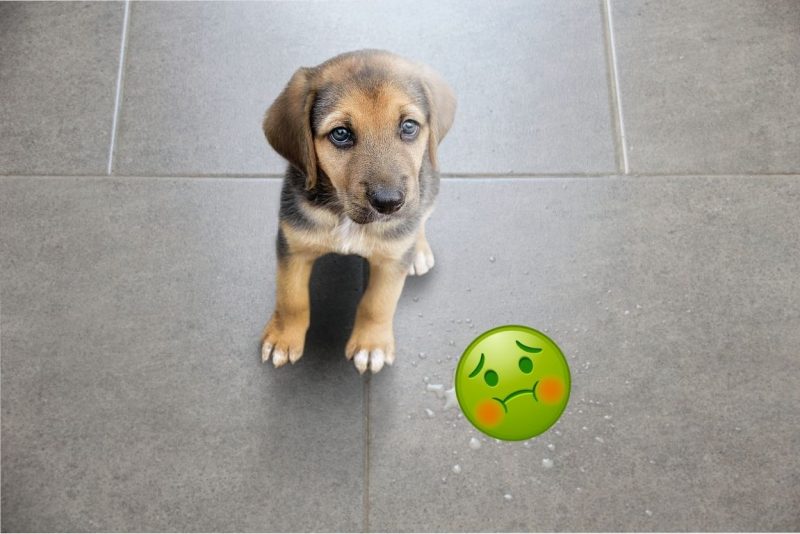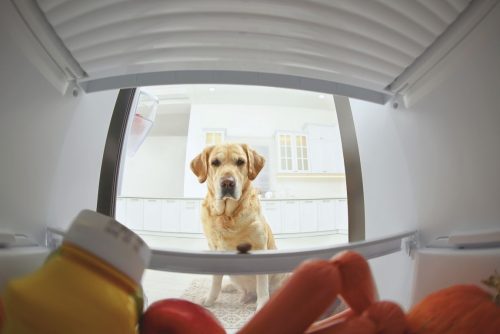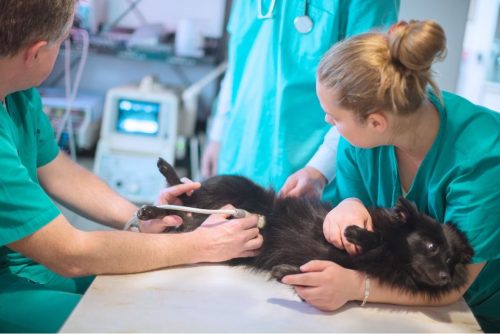280 Sheppard Ave E. Unit 102, Toronto, ON M2N 3B1 | 647-260-8387 | yonge.sheppard.vets@gmail.com
Acute Vomiting in Pets
Vomiting is a common symptom in dogs and cats that can leave pet parents worried. Just like in humans, vomiting can be a symptom arising from a large number underlying causes. While it’s comforting to know that occasional vomiting will usually resolve with a little tender loving care, it’s important to recognize when it might be a red flag for a more serious problem.

Topics Covered
As a responsible pet owner you may find yourself wondering when it’s time to sound the alarm and when it’s safe to take a wait-and see approach. In this article, we’ll delve into the reasons behind acute vomiting and discuss common diagnosis and treatment strategies to ensure the well-being of your beloved canine and feline companions. So, let’s dive in and uncover the mystery behind your pet’s upset tummy!
Common Causes of Acute Vomiting
There are a lot of things that can cause vomiting in pets. By being able to rule in or out the cause of your pets upset tummy, your vet can help ensure that your pet gets the treatment they need to get them feeling better.
1. Dietary Indiscretion
Dogs are known for their indiscriminate eating habits and sometimes they make bad choices. Consuming spoiled or inappropriate food, eating to quickly, or scavenging garbage can quickly lead to an upset tummy.
2. Gastrointestinal Obstruction
Sometimes our pets make bad choices that lead them to ingest foreign objects like toys, string, corncobs or socks, which can get stuck in the digestive tract, causing a life-threatening blockage and vomiting.

3. Infectious Disease
There are a variety of viruses, bacteria and parasites that can infect our furry friends which may result in vomiting. Some of the common culprits include parvovirus, roundworms, salmonella, helicobacter and leptospirosis.
4. Toxins and Medications
Ingesting toxic substances like chocolate, plants (such as lilies), human drugs and medications can trigger vomiting and other serious symptoms in dogs and cats.
5. Metabolic Disorders
Conditions that affect major organ function like the liver, kidney or pancreas can lead to severe vomiting.
6. Autoimmune and Allergic conditions
Some dogs and cats may develop a food sensitivity or allergy which can be characterized by vomiting.
7. Cancer
Unfortunately, cancer may also cause acute vomiting in dogs and cats. Although this is not something any pet owner wants to hear, it should always be considered, especially in our older patients.
Diagnosing Acute Vomiting in Pets AKA
the more you know
Diagnostic Testing allows your veterinarian to:
a) Rule out life threatening causes of vomiting
b) Provide prognostic information AKA how worried do we need to be?
c) Rule in some causes of vomiting that might require specific therapy (e.g. an intestinal foreign body that needs surgical intervention versus Addison’s disease which needs highly specific medication).
To do this your veterinarian may recommend a variety of diagnostic tests to try and identify the underlying cause of the vomiting. These may include:
- Physical Exam: Assess hydration and vitals as well as look for physical clues which can tell us what is causing the vomiting (e.g. abdominal mass or a string under the tongue). This can also tell us which pets are stable and likely ok to try symptomatic management and which pests likely need more aggressive treatment and work up.
- Blood Tests: To evaluate organ function and look for signs of infection
- Abdominal Imaging (X-rays or Ultrasound): To detect gastrointestinal obstructions or other structural abnormalities.
- Fecal analysis: To evaluate for parasites
- Infectious disease testing: Specific tests to look for parvovirus or fiv/felv or panleukopenia may be considered.

My veterinarian ran a bunch of tests and they were all normal - what now?!
You may find yourself in a situation where your veterinarian has conducted tests, and to your relief (or perhaps frustration), everything appears normal. Don’t worry, you’re not alone! In many cases of vomiting, the precise cause remains elusive even after thorough examination.
But why is this good news?
One of the most important reasons to perform tests is to rule out serious conditions that might demand immediate attention, such as surgical intervention for a potential blockage. The absence of abnormal findings is, in fact, a positive outcome, allowing you and your veterinarian to breathe a little easier. With the scary causes ruled out, the focus can shift to managing your pet’s vomiting symptoms. Your veterinarian may recommend a plan for symptomatic relief or, if necessary, suggest more specific testing down the line.
Treatment Options for Acute Vomiting
The treatment approach for acute vomiting will depend on the severity of the symptoms and the underlying cause (if and when identified).
- For patients with vomiting lasting less than 24hrs, normal vitals and hydration: your veterinarian may recommend a short fast (6-12 hrs) followed by feeding small frequent meals of a bland diet (Please see Home care for acute vomiting in dogs)
- Fluid Therapy: In dogs with evidence of dehydration your veterinarian may recommend hospitalization for IV fluids or, for more mild dehydration, subcutaneous fluids. This will help correct dehydration, restore electrolyte balance and maintain hydration while your pet is recovering.
- Medications: Anti-vomiting medications can help control vomiting and relieve discomfort allowing your pets body some much needed relief.
- Addressing the underlying cause: Specific treatment protocols will be implemented based on the diagnosed cause, such as surgery or specific medication therapy.
Can’t get to the Veterinarian? Home Care Options for Pets
Step 1
No food or water for 6-12 hrs to allow the tummy a chance to rest and recuperate. (Not recommended in puppies/kittens less than 2mo or weighing less than 2kg)
Step 2
If no vomiting occurs in 6-12 hrs food and water can be introduced SLOWLY. We suggest offering 1-2 tbsp of a bland diet (e.g. Royal Canin Gastrointestinal, Hill’s Biome, Hill’s ID) paired with a few sips of water. Then wait 1-2 hours. If no vomiting occurs, offer the same amount again and repeat for the next 24hrs.
Pro-Tip
GO SLOW. We don’t want to overburden a sensitive tummy with a whole bunch of food or water …even if they seem thirsty or hungry. Fast expansion of a sensitive tummy might result in vomiting resulting in dehydration and sending us back to square one.
Home-cooked Bland Diet Options: cooked lean ground beef or chicken + rice
Step 3
If no vomiting occurs then the next day you can start to offer water freely and divide the bland diet into 3-4 small meals. We recommend continuing the bland diet until your pet has been normal for 48hrs.
Step 4
Once symptoms have subsided for 48hrs you can slowly transition your pet back to their regular diet. We recommend transitioning over the course of 3-5 days.
**Should symptoms persist, worsen or change, have your pet evaluated by a veterinarian**
When to Seek Veterinary Veterinary Attention
While many instances of mild vomiting will resolve spontaneously with some TLC and supportive care at home, it is crucial to understand when vomiting necessitates medical attention.
1. Vomiting Lasting More than 48 Hours with No Improvement
2. Moderate to Severe Lethargy
3. Puppies or Kittens Under 16 Weeks of Age or those weighing less than 1kg
Young animals are more vulnerable and can deteriorate quickly. If they’re vomiting, it’s better to err on the side of caution and consult a veterinarian.
4. Non-Productive Retching
If your dog is attempting to vomit but nothing is coming out, it can indicate a GDV (gastric dilatation and volvulus). This is most common in our large and giant breed dogs. This is a true emergency, and you should head to an emergency room right away.
Occasionally patients may aspirate after vomiting, resulting in pneumonia. This is most common in our brachycephalic breed dogs (like bulldogs and persians) Any indications of difficulty breathing or respiratory distress are serious and warrant immediate attention at an emergency veterinary clinic.
Prevention of Acute Vomiting in Pets
Regular Veterinary Check-ups
Regular wellness examinations and vaccines can help identify potential health issues early on and prevent potentially life threatening diseases and infections.
Proper Diet and Feeding Practices
Provide a well-balanced, high-quality diet and avoid sudden changes in food.
Avoid Access to Harmful Substances
Keep household chemicals, medications, toxic plants, and other hazardous materials out of your pet’s reach.

At Yonge Sheppard Animal Hospital, we’re dedicated to providing top-notch care for your pets. If you have questions about your pet’s health or need advice, don’t hesitate to contact us by call/text at 647-260-8387 or by email at yonge.sheppard.vets@gmail.com. Your pet’s happiness and health matter to us every day!
– The Yonge Sheppard Animal Hospital Team


